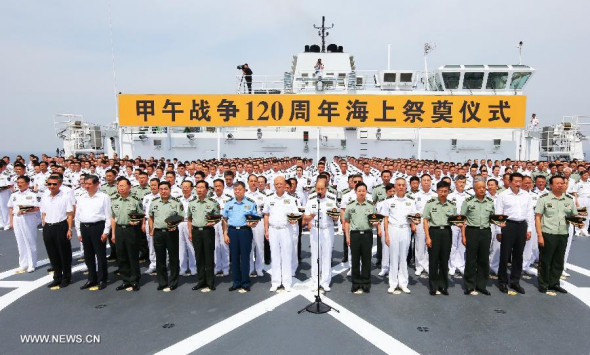

Officers and soldiers of the People's Liberation Army (PLA) Navy mourn the Chinese navy soldiers killed in the First Sino-Japanese War of 1894-1895 on a ship in a port of Weihai, east China's Shandong province, Aug 27, 2014. (Xinhua/Zha Chunming)
The People's Liberation Army (PLA) Navy on Wednesday held a memorial ceremony for the First Sino-Japanese War of 1894-1895 on the sea near Weihai port in east China's Shandong province.
A two-day seminar was scheduled for Wednesday and Thursday on the PLA Navy ship to commemorate the 120th anniversary of the war, also known as the Jiawu War, by the Navy and the PLA Academy of Military Sciences.
"The war interrupted China's development course, aggravated the nation's woes, and aroused people's awareness," according to Senior Colonel Xing Guangmei, the Navy's spokeswoman, on Tuesday in Weihai.
"Mourning the Chinese navy soldiers killed in the war and deep reflection on the painful historical lesson are of great significance to building and developing the PLA Navy," Xing said, adding that it is especially important in light of the complicated marine security situation.
During the ceremony, about 600 soldiers, officers and military scholars stood in silent tribute and flowers were thrown into the sea. Nineteen guns were fired.
At the same time, naval vessels berthed in their ports nationwide sounded their sirens in honor of the martyrs of the Beiyang Fleet of the Qing Empire (1644-1911), which had been based on Weihai's Liugong Island.
Navy commander Wu Shengli, who is also a member of the Central Military Commission, in his speech at the ceremony called on soldiers to enhance their capabilities in safeguarding national sovereignty, security and development interests.
On July 25, 1894, Japanese warships attacked two Chinese vessels off the Korean port of Asan. At the time, Korea was a tributary of the Qing Empire. By March 1895, the Chinese land army and navy were beaten, the first time China had lost to Japan in military conflict.
China's loss was attributed to the corrupt and incompetent Qing Empire. The Shimonoseki Treaty, signed to end the war, ceded the Liaodong Peninsula in northeast China, Taiwan and the nearby Penghu Islands to Japan.
Copyright ©1999-2018
Chinanews.com. All rights reserved.
Reproduction in whole or in part without permission is prohibited.